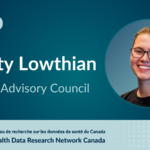Trinity Lowthian: Paralympic athlete’s journey to health & health data


Some people might think health data belong in the realm of analysts, scientists and doctors. But for Trinity Lowthian, one of the newest members of HDRN Canada’s Public Advisory Council, it is firmly within the purview of regular people. “It seems like common sense to involve those whose data is being collected. Engaging the public is not just a matter of policy but a fundamental aspect of ensuring that health data practices are aligned with the needs and expectations of the people they affect.”
Although she didn’t know a lot about health data, Lowthian was convinced it was an important area for self-education, leading her to apply to become a member of the PAC. “My journey into health data began with a profound curiosity about an area I knew little about,” she said. “My lack of prior knowledge motivated me to dive deeper and immerse myself in this field as a member of the public. I saw it as an opportunity to learn from experts and contribute meaningfully to the dialogue surrounding health data.”
The coolest aspect of attending the 2024 Paralympics is the opportunity to be part of a vibrant community of athletes with diverse experiences and disabilities. ~ Trinity Lowthian
Lowthian’s perspective reflects a shared understanding of the PAC about the critical role health data play in influencing both individual health care and population level health. “Health data are inherently personal, belonging to Canadians and impacting their health care experiences directly,” she noted. “Effective data collection and interpretation are crucial at both the beginning and the end of the health care cycle. So it’s essential that we continue to listen to patients and the public, ensuring that their preferences are incorporated into health data practices.”
Lowthian’s desire to deepen her understanding of health data and to collaborate with a diverse group of experts spurred her to apply to become a member of the PAC. “I wanted to learn from individuals with extensive knowledge and experience in health data while contributing my own perspective, particularly from a youth standpoint,” she explained. “My goal is to help create tangible resources and ideas that extend beyond the council and continue to benefit the community.”
But thinking about health data isn’t the only thing that keeps Lowthian busy. In addition to her role on HDRN Canada’s Public Advisory Council, she is a university student at Ottawa University taking nutrition and food science and a Paralympic athlete. Lowthian has spent the last two years preparing for the Paris 2024 Paralympics , where she will represent Canada in wheelchair fencing. Her journey to this point has been marked by resilience and determination, transitioning from a background in various sports to discovering wheelchair fencing as a new avenue for competition and personal growth.
Trinity’s experiences in sport have also had a profound impact on her personal development. “Fencing has given me motivation and a sense of purpose, especially after a period of illness,” she said. “The mental and social benefits of being involved in sport have been incredibly valuable, and I look forward to continuing my involvement in some capacity.”
As she continues her journey with the PAC in engaging the public around the importance of health data, Trinity is focused on contributing to the development of impactful resources and fostering a diverse and inclusive council. “I hope to see the PAC grow and evolve, welcoming members from all across Canada, including underrepresented regions.
